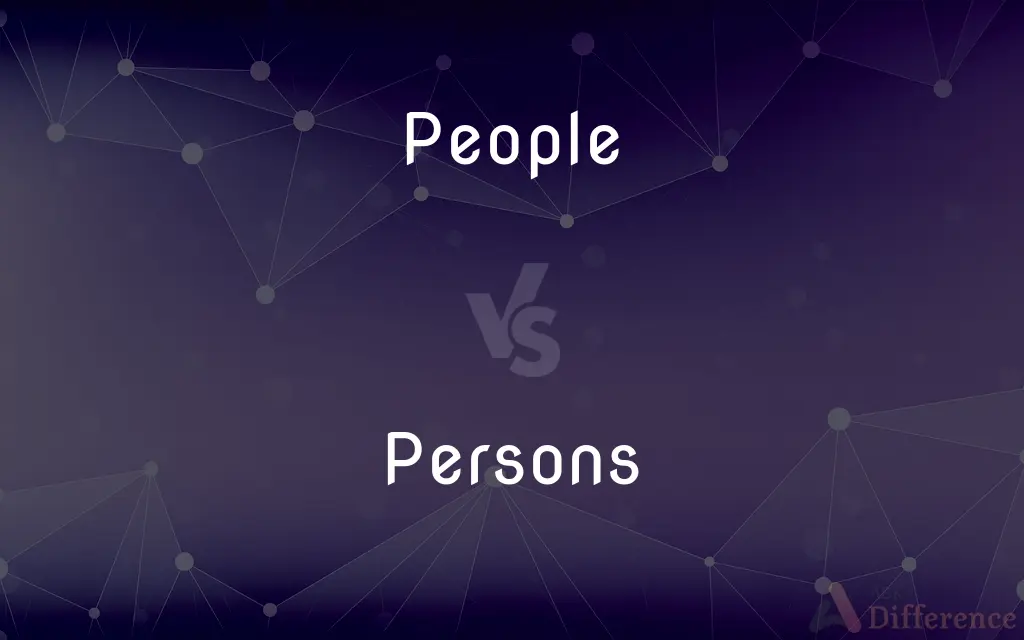People vs. Persons — What's the Difference?
By Tayyaba Rehman — Updated on October 27, 2023
People generally refers to a group or multitude, while persons is the plural of person, often used in formal or legal contexts.

Difference Between People and Persons
Table of Contents
ADVERTISEMENT
Key Differences
People is used for a group or collection of individuals, often implying a sense of community. Persons, while technically the plural of person, is used in more formal or legal contexts.
People often denotes a body of individuals united by common interests, culture, or nationality. Persons emphasizes the individuality of the members within a group.
The use of people is more common in everyday language. Persons is often reserved for official, legal, or formal documents.
People can refer to a large, indefinite number, often used in a general sense. Persons is used when counting or specifying individuals.
In essence, people is the more casual and commonly used term. Persons is used for specificity and formality, particularly in legal language.
ADVERTISEMENT
Comparison Chart
Definition
Group or multitude of individuals
Plural of person, often in formal contexts
Usage
Common, everyday language
Formal, legal, or official documents
Implication
Community, collective identity
Individuality, specificity
Commonality
More frequently used
Less frequently used
Context
General, casual contexts
Specific, formal contexts
Compare with Definitions
People
Members of a particular nation, community, or ethnic group.
The indigenous people have a rich culture.
Persons
Individuals, especially in legal or formal contexts.
The document listed all persons involved in the case.
People
Persons collectively, as in a workforce or audience.
All the people at the concert enjoyed the show.
Persons
Plural of person, emphasizing individuality.
There were three persons in the room.
People
The body of persons who constitute a community.
The people of the city voted in the election.
Persons
Separate individuals, often in official statistics or records.
The report showed the incomes of different persons.
People
A people is a plurality of persons considered as a whole, as is the case with an ethnic group, nation or the public of a polity.
Persons
Used when counting or specifying individuals.
The rule applies to all persons under 18.
People
Human beings in general or considered collectively
The earthquake killed 30,000 people
People think I'm mad
Persons
Persons as entities with legal rights.
The law protects the rights of all persons.
People
The members of a particular nation, community, or ethnic group
The native peoples of Canada
Persons
A living human. Often used in combination
Chairperson.
Salesperson. See Usage Note at chairman.
People
The supporters or employees of a person in a position of power or authority
I've had my people watching the house for some time now
Persons
An individual of specified character
A person of importance.
People
(of a group of people) inhabit (a place)
An arid mountain region peopled by warring clans
Persons
The composite of characteristics that make up an individual personality; the self.
People
Humans considered as a group or in indefinite numbers. Often treated as a plural of person, alone and in compounds
People were dancing in the street. I met all sorts of people. This book is not intended for laypeople.
Persons
The living body of a human
Searched the prisoner's person.
People
The mass of ordinary persons; the populace. Used with the
"those who fear and distrust the people, and wish to draw all powers from them into the hands of the higher classes" (Thomas Jefferson).
Persons
Physique and general appearance.
People
A body of persons living in the same country under one national government; a nationality.
Persons
(Law) A human, corporation, organization, partnership, association, or other entity deemed or construed to be governed by a particular law.
People
The citizens of a political unit, such as a nation or state; the electorate. Used with the.
Persons
(Christianity) Any of the three separate individualities of the Father, Son, and Holy Spirit, as distinguished from the essence of the Godhead that unites them.
People
Pl. peo·ples A body of persons sharing a common religion, culture, or language
The peoples of central Asia.
Persons
Any of three groups of pronoun forms with corresponding verb inflections that distinguish the speaker (first person), the individual addressed (second person), and the individual or thing spoken of (third person).
People
Persons with regard to their residence, class, profession, or group
City people.
Farming people.
Persons
Any of the different forms or inflections expressing these distinctions.
People
Persons subordinate to or loyal to a ruler, superior, or employer
The manager would like to introduce you to our people in the regional office.
Persons
A character or role, as in a play; a guise
"Well, in her person, I say I will not have you" (Shakespeare).
People
A person's family, relatives, or ancestors
Where are your people from?.
Persons
Plural of person
Which persons are responsible for this mess?
People
(Informal) Animals or other beings distinct from humans
Rabbits and squirrels are the furry little people of the woods.
People
To settle or inhabit with people; populate.
People
To be present in or on (a place)
"The stores ... are peopled by serious shoppers" (Perri Klass).
People
Used as plural of person; a body of human beings considered generally or collectively; a group of two or more persons.
There were so many people at the restaurant last night.
People
(countable) Persons forming or belonging to a particular group, such as a nation, class, ethnic group, country, family, etc.
People
A group of persons regarded as being employees, followers, companions or subjects of a ruler.
People
One's colleagues or employees.
People
A person's ancestors, relatives or family.
My people lived through the Black Plague and the Thirty Years War.
People
The mass of a community as distinguished from a special class (elite); the commonalty; the populace; the vulgar; the common crowd; the citizens.
People
Plural of person.
People
(transitive) To stock with people or inhabitants; to fill as with people; to populate.
People
(intransitive) To become populous or populated.
People
(transitive) To inhabit; to occupy; to populate.
People
To interact with people; to socialize.
People
The body of persons who compose a community, tribe, nation, or race; an aggregate of individuals forming a whole; a community; a nation.
Unto him shall the gathering of the people be.
The ants are a people not strong.
Before many peoples, and nations, and tongues.
Earth's monarchs are her peoples.
A government of all the people, by all the people, for all the people.
People
Persons, generally; an indefinite number of men and women; folks; population, or part of population; as, country people; - sometimes used as an indefinite subject or verb, like on in French, and man in German; as, people in adversity.
People were tempted to lend by great premiums.
People have lived twenty-four days upon nothing but water.
People
The mass of community as distinguished from a special class; the commonalty; the populace; the vulgar; the common crowd; as, nobles and people.
And strive to gain his pardon from the people.
People
One's ancestors or family; kindred; relations; as, my people were English.
People
To stock with people or inhabitants; to fill as with people; to populate.
As the gay motes that people the sunbeams.
People
(plural) any group of human beings (men or women or children) collectively;
Old people
There were at least 200 people in the audience
People
The body of citizens of a state or country;
The Spanish people
People
The common people generally;
Separate the warriors from the mass
Power to the people
People
Members of a family line;
His people have been farmers for generations
Are your people still alive?
People
Fill with people or supply with inhabitants;
People a room
The government wanted to populate the remote area of the country
People
Make one's home or live in;
She resides officially in Iceland
I live in a 200-year old house
These people inhabited all the islands that are now deserted
The plains are sparsely populated
People
A group of individuals.
The people in the town were friendly.
People
Individuals, often implying variety or multitude.
There were many people at the market today.
Common Curiosities
Can persons be used casually?
It's grammatically correct but may sound overly formal in casual conversation.
When should I use people instead of persons?
Use people in casual or general contexts, and persons in formal or legal settings.
Can people be used in legal documents?
Typically, legal documents prefer persons for precision.
Is it correct to say '10 persons'?
Yes, especially in formal or legal contexts where specificity is needed.
Is the use of persons outdated?
Not outdated, but it's less common and more formal.
Is it ever wrong to use people?
Not wrong, but in formal or legal contexts, persons may be more appropriate.
Can I use people in academic writing?
Yes, but ensure it fits the tone and style of your writing.
Can a business say '50 persons served daily'?
Yes, it emphasizes individual service but using people is also acceptable.
Do people and persons mean the same thing?
Essentially, yes, but their usage differs based on formality and context.
Why do legal texts prefer persons?
For precision and clarity, especially when referring to individual rights or counts.
Is there a difference in meaning between people and persons?
The core meaning is similar, but their usage and connotations differ.
In what context is persons preferred?
In legal, formal, or when specifying individual members of a group.
Are there instances where only people should be used?
In casual conversation or when referring to a community or nation, people is preferred.
Can I use persons in everyday speech?
You can, but it might sound unusually formal.
Does the usage of people vs. persons vary by region?
Generally, the usage is consistent, but preferences may vary slightly.
Share Your Discovery

Previous Comparison
Calvary vs. Cavalry
Next Comparison
Stimulus vs. IncentiveAuthor Spotlight
Written by
Tayyaba RehmanTayyaba Rehman is a distinguished writer, currently serving as a primary contributor to askdifference.com. As a researcher in semantics and etymology, Tayyaba's passion for the complexity of languages and their distinctions has found a perfect home on the platform. Tayyaba delves into the intricacies of language, distinguishing between commonly confused words and phrases, thereby providing clarity for readers worldwide.














































